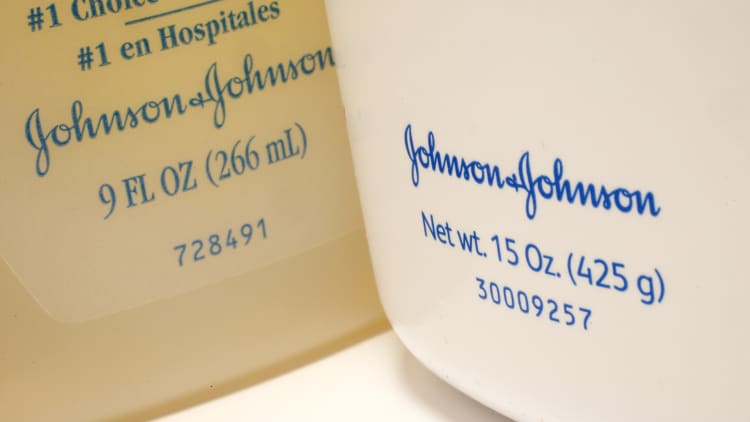
Johnson & Johnson shares fell 1% Tuesday despite the company posting a 42% profit spike as concerns about lawsuits the company faces regarding its talc-based baby powder and its alleged role in the opioid crisis weighed on investors.
Here's what the company reported compared with Wall Street estimates, based on a survey of analysts by Refinitiv:
- Earnings per share: $2.58, adjusted, vs. $2.46 expected
- Revenue: $20.56 billion vs. $20.29 billion expected
J&J makes everything from Acuvue contacts to cancer drugs like Zytiga to Aveeno lotion. The company's three businesses all performed better than expected in the second quarter. Yet shares dropped Tuesday as Chief Financial Officer Joseph Wolk addressed thousands of ongoing lawsuits J&J faces alleging its talc-based baby powder caused ovarian cancer and mesothelioma, as well as a lawsuit from Oklahoma calling J&J a "kingpin" in the state's opioid epidemic.
Wolk told analysts J&J will continue to defend the company's actions and its baby powder. He noted the "next major event" starts on July 22, when a federal judge will evaluate whether available evidence is admissible, in court proceedings known as Daubert hearings. Wolk said the multi-district litigation covers about 85% of the outstanding cases.
In regards to Oklahoma's lawsuit against J&J, Wolk said "the facts simply just don't align to what the state is claiming." Still, SVB Leerink analyst Danielle Antalffy said "the biggest thing" on her mind is the company's exposure to talc and opioid litigation.
J&J reported reported second-quarter net income of $5.61 billion, or $2.08 per share, a 42% increase from the $3.95 billion, or $1.45 per share, it posted a year earlier. Excluding an intangible amortization expense and special items, J&J earned $2.58 per share, beating the $2.46 per share expected by analysts surveyed by Refinitiv.
Antalffy estimates other income, particularly J&J's divestiture of its Advanced Sterilization Products business, boosted J&J's quarterly earnings by about 20 cents.
Net sales dropped 1.3% to $20.56 billion but still came in above analysts' expectations of $20.29 billion.
J&J's pharmaceutical business, which accounts for half of the company's revenue and includes psoriasis drugs like Stelara and Tremfya, posted revenue of $10.53 billion, better than the $10.31 billion projection compiled by StreetAccount.
J&J's consumer unit, which makes Aveeno body care and J&J's namesake baby products, reported revenue of $3.54 billion, topping the $3.52 billion analysts expected. Its medical device business, which includes Acuvue contacts and Ethicon surgical products, reported revenue of $6.49 billion. Analysts had expected $6.43 billion.
J&J boosted its full-year sales forecast to between $80.8 billion and $81.6 billion, up from the previously projected range of $80.4 billion to $81.2 billion. The company did not raise its earnings forecast, reiterating its prior estimate of adjusted earnings in the range of $8.53 to $8.63 per share.
"If you look at our earnings growth this year, we're maintaining it, it's two times the rate of sales growth," Wolk told CNBC's "Squawk Box." "We think that's very healthy, and we look to the long term, so this gives us a great opportunity to invest in our portfolio, to either accelerate, fortify or even add to our pipeline going forward so that we do solidify not just the next six months, but many, many, many more years to come."
Shares of J&J were down 1.3% in afternoon trading.
The company is trying to balance declining sales from some of its top drugs, like Zytiga, while introducing new ones, like Spravato.
Sales of Zytiga declined 23% year over year, with the prostate cancer drug facing competition from generic drugs in the U.S. after losing patent protection last fall. Revenue from Remicade, used to treat arthritis and some bowel conditions and skin conditions, dropped 16% from the year-earlier quarter. The declines were not as steep as analysts had feared.
One weakness Antalffy pointed to was a 19% decrease in sales of its blood thinner Xarelto.
In the quarter, J&J set aside $190 million in the quarter to defend itself in talc lawsuits.
"As a CFO, I consider costs as a potential settlement opportunity, but our overarching strategy is to continue to defend ourselves for this product when the facts are so overwhelmingly on our side," Wolk said.
J&J's stock slid nearly 4% last week after Bloomberg reported that a grand jury is examining documents as part of a criminal probe whether J&J lied about the possible cancer risks of its talcum powder.
Wolk said the report was "not new news" and "the surprise, if anything, was the fact it was considered news." J&J disclosed in February that it had received subpoenas.
"We're complying fully and cooperating fully with the Department of Justice," he said. "It's an astute organization, and I'm sure once they go through the facts they'll come to the same conclusions that the company acted responsibly and the product is safe."
Correction: An earlier version misstated J&J's pharmaceutical business results. The unit posted $10.53 billion in revenue, beating analysts' expectations of $10.31 billion.


